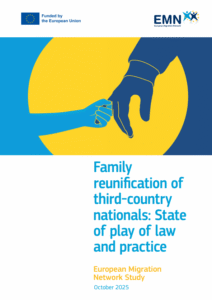EMN Study ”Family reunification of third-country nationals in the EU” has been published
06.10.2025The European Migration Network (EMN) has published a new study titled “Family reunification of third-country nationals in the EU: state of play of law and practice”. Family reunification has long been one of the main channels of legal migration to the EU, accounting for 26% of all first residence permits issued in 2023. It plays a crucial role in upholding the right to family life under international and EU law and supporting the integration of third-country nationals.
Key trends and findings:
- Family reunification policies have evolved significantly since 2017 when the last study on family reunification was published by the European Migration Network (EMN), with many Member and Observer Countries aligning their national laws with European Union (EU) case law, introducing digitalised procedures, and embedding family reunification in broader migration and labour strategies.
- EMN Member and Observer Countries have increasingly differentiated their approaches, facilitating family reunification for attracting certain categories such as skilled workers, while introducing stricter requirements for other groups, such as age thresholds, waiting periods, and proof of income.
- Eligibility rules for sponsors and family members vary, with most countries permitting third-country nationals with valid permits to act as sponsors. Definitions of eligible family members range from nuclear to extended family, depending on factors such as dependency and humanitarian grounds.
- Material and integration requirements remain key conditions for family reunification, although many countries apply exemptions or case-by-case flexibility for vulnerable groups such as beneficiaries of international protection (BIP), unaccompanied minors, and older adult dependents.
- Application procedures differ between Member States, including who can submit the application and how (via consulates, in-person, or online). Required documents, when unavailable, may be substituted with alternative evidence such as interviews or DNA testing, witness statements and history records of the family.
- Delays, high costs and administrative burdens persist, especially for applicants from conflict-affected regions. Good practices include digitalisation, priority processing for minors, and inter-agency coordination emerging as effective solutions.
- Post-reunification access to rights such as education, employment, and healthcare is generally granted, often supplemented by tailored support like language training, diploma recognition, and vocational services, particularly for BIP.
- Early access to long-term or autonomous residence varies, and delays risk dependency on the sponsor. Some countries provide conditions for earlier access in cases of domestic violence or widowhood and are exploring broader equal rights frameworks to enhance integration.
Please find the study and accompanying materials here.
